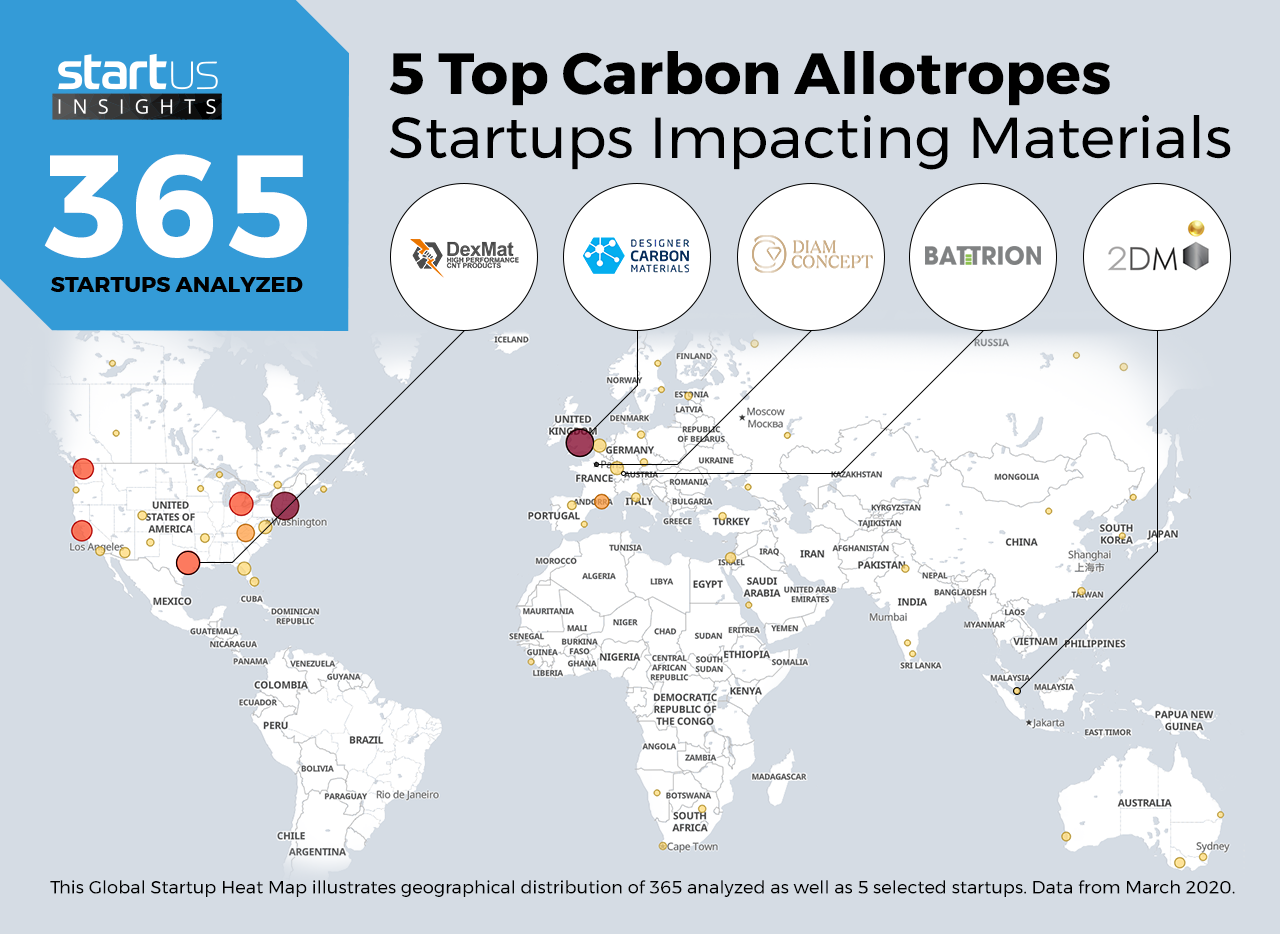Accelerate Productivity in 2025
Reignite Growth Despite the Global Slowdown
Our Innovation Analysts recently looked into emerging technologies and up-and-coming startups working on solutions for the materials sector. As there is a large number of startups working on a wide variety of solutions, we want to share our insights with you. This time, we are taking a look at 5 promising carbon allotropes startups.
Heat Map: 5 Top Carbon Allotropes Startups
Using our StartUs Insights Platform, covering 1.116.000+ startups & emerging companies, we looked at innovation in the field of carbon allotropes. For this research, we identified 365 relevant solutions and picked 5 to showcase below. These companies were chosen based on a data-driven startup scouting approach, taking into account factors such as location, founding year, and technology among others. Depending on your specific criteria, the top picks might look entirely different.
The Global Startup Heat Map below highlights 5 startups & emerging companies developing carbon allotrope solutions. Moreover, the Heat Map reveals regions that observe a high startup activity and illustrates the geographic distribution of all 365 companies we analyzed for this specific topic.
DexMat – Carbon Nanotubes (CNT)
Carbon nanotubes (CNT) consist of cylindrically rolled graphene layers, measured in nanometers. Their specific form allows carbon nanotubes to solve the industrial material challenges of tolerating high working temperatures and maintaining a remarkable strength-to-weight ratio in demanding environments. Therefore, startups across the world utilize CNTs to boost energy storage capacity, enhancing electrical lines transmission and improving industrial fibers’ strength, and more.
The US-based startup DexMat develops patented technology to create high-strength CNT fibers (e.g. for wires or ropes) and films for the energy, consumer electronics, and aerospace industries. DexMat’s product combines the best of both worlds: the electrical conductivity of metals, as well as flexibility, lightweight, and corrosion resistance of plastics.
Designer Carbon Materials – Fullerenes
Fullerenes comprise single- or double bond-connected carbon atoms, shaped like a sphere (e.g. “buckyball”), cylinder, or ellipsoid. Their chemical stability and antiviral and antioxidant properties make fullerenes an exciting material for anti-cancer treatment and research as well as biological experiments. Besides, emerging companies work to apply fullerenes for superconductors, fuel tanks, and nanoscale devices.
The UK-based company Designer Carbon Materials synthesizes endohedral fullerenes with one or more metals incorporated into the formulation. The company also produces endohedral nitrogen fullerenes with isomerically enriched nitrogen. One of the product’s recent use cases includes enhanced timekeeping for atomic clocks.
Diam Concept – Diamonds
A diamond is a single-element cubic-lattice carbon allotrope, considered the hardest material in the world. It possesses decent transparency, light dispersion, fluorescence properties and finds applications in jewelry, industrial tools, and lasers, among others. The diamond sector faces concerns such as eco-unfriendly exploration practices, labor exploitation, and cartel pricing. Startups are working on ways to decrease costs while ethically producing diamonds with a low carbon footprint.
French startup Diam Concept manufactures chemical vapor deposition (CVD) reactors to produce laboratory-grown diamonds. The company’s method creates plasma with molecular hydrogen and methane that then creates key species for diamond growth. Thanks to a controlled environment and proprietary process, the startup produces cost-effective diamonds in a more sustainable way, compared to conventional mining.
Battrion – Graphite
Graphite represents a set of hexagonally-shaped layers of carbon. Thanks to high electrical conductivity and proper heat transfer characteristics, graphite becomes useful for lubricants, electrodes, energy storage, and photovoltaics (PVs). Nowadays, new demanding lithium-ion (Li-Ion) applications such as batteries for electric vehicles (EVs), aerospace, and industrial machines require batteries with better performance and thermal management. This is where graphite solutions come in handy.
Switzerland-based startup Battrion develops the patented Aligned Graphite® technology for contemporary lithium-ion batteries. The technology assists in continuously directing the orientation of graphite molecules inside a negative electrode. As a result, the solution creates shorter diffusion paths, facilitates quicker charging and increased safety.
2DM – Graphene
Graphene is a novel 2D honeycomb lattice-shaped carbon allotrope with an extremely thin one-layer structure. It has excellent mechanical strength, flexibility, and light absorption qualities. Due to the fact that producers usually obtain graphene out of graphite, startups concentrate on streamlining its exfoliation and CVD production techniques. These emerging companies are also developing graphene nanoformulations for use in the manufacturing, energy, and healthcare, industries among others.
Singapore-based startup 2DM produces high-quality and high-purity graphene through a proprietary and scalable manufacturing process. 2DM’s graphene capabilities span from pristine powder nanoplatelets and formulations to industrial additives, polymer masterbatches, coatings, and lubricants.
What About The Other 360 Solutions?
While we believe data is key to creating insights it can be easy to be overwhelmed by it. Our ambition is to create a comprehensive overview and provide actionable innovation intelligence so you can achieve your goals faster. The 5 startups showcased above are promising examples out of 365 we analyzed for this article. To identify the most relevant solutions based on your specific criteria, get in touch.








